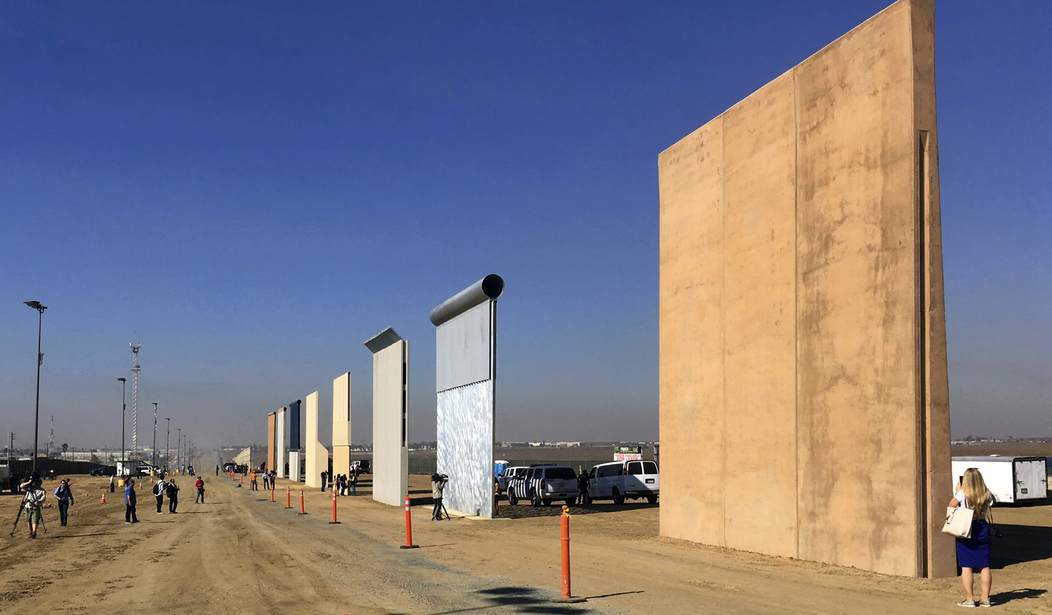Every now and then, some article from two or three or ten years ago makes the rounds on social media, and sometimes you don’t notice that it’s old news until after you’ve read it and gotten all worked up about it. Such was my experience the other day when somebody on my Facebook feed posted a piece from the Atlantic called “The Case for Getting Rid of Borders—Completely.” I was about to bang out a response to this ridiculous screed, written by one Alex Tabarrok, when I noticed that it was dated October 10, 2015.
Nonetheless, I couldn’t get the thing out of my mind. How could I? It was bonkers. And, as we’ll see, Tabarrok is far from the only person in a respectable-sounding position who’s made this argument in the last few years. So here goes. “All people,” asserted Tabarrok, “should be free to move about the earth, uncaged by the arbitrary lines known as borders.” Closed borders “cement…inequality into place”; immigration, by contrast, “is the greatest anti-poverty program ever devised.” There is no moral defense, then, for denying people freedom of movement. “Human rights do not stop at the border,” Tabarrok argues. “Today, we treat as pariahs those governments that refuse to let their people exit. I look forward to the day when we treat as pariahs those governments that refuse to let people enter.”
Full points for virtue signaling; “F” for realism. Need one explain why? There’s a huge difference between the West and the rest, and it isn’t just a matter of wealth vs. poverty. I suspect that a great many people in the West are insufficiently aware of just how much better their countries are than others in all kinds of ways, and are thus incapable of realizing just how attractive they are to people unfortunate enough to be born elsewhere. Or perhaps some people in the West are too politically correct to admit, even to themselves, just how much better the West is than the rest.
But facts are facts. Look through the State Department reports on the hundred or so poorest countries in the world and read a few at random, and you’ll soon recognize that inviting their citizens to move next door to you is to put out the welcome mat for people to whom the world is a far different place than it is to you: a place marked by murderous hatreds between tribal and religious groups; a place where virtually every economic transaction involves some kind of corruption; a place where men take for granted their right to brutally abuse their wives and children; a place where due process is unheard of, where police officers and soldiers can beat, torture, and even kill with impunity, and where judges know nothing of justice; a place where sanitation and medical care are primitive; and a place where the rare soul who refuses to cheat and steal on a daily basis is not viewed as a paragon of virtue but as a fool.
Now, people can be easily removed from such cultures, but they cannot easily be liberated from what those cultures have done to them. Some people living under tyranny and barbarism genuinely long for honest employment and for freedom, and have skills and work ethics that would be of value to any country; surely a reliable way should be found to identify such persons and give them a new life. But most people from such places are hard-wired with that tyranny and barbarism, and take it with them wherever they go.
Nor are we talking about small populations being introduced into large ones. Tabarrok, I have discovered, is from Iran, which is home to 81 million people, more than every European country except Germany (83 million) and Russia (147 million), if you want to count Russia as European. The only other developed countries larger than Iran are the U.S. (323 million) and Japan (127 million). I have to assume that Tabarrok knows very well that if there were open borders worldwide, the traffic would be from countries like China (1.4 billion), India (1.3 billion), Indonesia (262 million), Pakistan (211 million), Nigeria (193 million), Bangladesh (164 million), the Philippines (106 million), and so on, and the destinations, in addition to the U.S., would be nations like Australia (25 million), the Netherlands (17 million), Switzerland (8 million), and Norway (5 million).
Notice the difference? See the problem? The extraordinary imbalance between the populations of the Third World and of the West are, I think, often forgotten by Western idealists who, accustomed to thinking of their own homelands as great and powerful, don’t realize how puny they actually are alongside dozens and dozens of the planet’s poorer lands, whose inhabitants, in a world of open borders, would overwhelm the richer societies in a trice, creating social havoc and economic disaster. To an extent, I suspect, many Westerners see the world much as it was a century ago, when the ten largest cities on the globe were London, New York, Paris, Berlin, Chicago, Vienna, Tokyo, St. Petersburg, Manchester, and Philadelphia. Today that list reads as follows: Tokyo, Jakarta, Seoul, Delhi, Shanghai, Beijing, New York, Karachi, Sao Paulo, Lagos. To walk through the streets of any one of several hundred cities outside the Western world on an ordinary afternoon is to find oneself in a crush of humanity reminiscent of Times Square on New Year’s Eve.
Speaking of New Year’s Eve: recall what happened in Cologne and other cities on New Year’s Eve 2015-16, when thousands of ethnic German women were sexually assaulted by foreigners – most of them part of the nearly one million-strong flood of so-called refugees whom Angela Merkel had allowed into the country during the previous year. In these New Year’s Eve incidents, civilization, of which such large-scale, peaceful celebratory events form an integral part, was instantly reduced to savagery. And this was the result of opening the borders of a nation of 83 million to one million outsiders – only one million, in a world of 7.6 billion people the overwhelming majority of whom live in societies marked by everyday savagery. Are people like Tabarrok – who is the co-author of a major economics textbook and holds an endowed chair at the Mercatus Center at George Mason University – really incapable of imagining what would happen to Western Europe and North America if a billion or two deperately poor people suddenly showed up?
I wondered about Tabarrok’s own life. I found his address and located his house on Google Maps. He lives, as it happens, in one of these idyllic Virginia suburbs with wide curvy roads and well-kept lawns. It’s clear that Tabarrok enjoys having his own space. On the one hand, I suppose it’s easy for some people living in such neighborhoods to enthuse over open borders, because to them it’s a purely abstract idea; but someone like Tabarrok, who has lived in Iran, surely must realize what open borders would do soon enough to his cozy, tranquil existence in his leafy bedroom community. Even America, for all its expanse, is not big enough to avoid being drastically transformed by such a development. He must also realize that, at the very least, hundreds of millions of the people who, given open borders, would flow into the West would be in search of big welfare payouts, not hard work, and would be eager to impose their own cultural values on their new homelands rather than adapt. (Certainly the history of Western Europe during the last few decades has not provided a promising picture in this regard.)
Alas, Tabarrok isn’t alone. Since his silly piece appeared in the Atlantic, similar articles – making pretty much the same arguments – have turned up all over the place. From the New Internationalist, November 2017: “Borders are a form of global apartheid.” From the Washington Post, March 2017: “all six Nobel Prize winners in the United States last year were immigrants.” (Did they cross the Rio Grande on foot or in a car trunk?) From the Guardian, this past February: “Today, Donald Trump and his supporters see migrants as the barbarians at the gate. However, future generations may look back on our era and see the people violently manning the gates as the true barbarians.” What about the danger of the U.S. being overwhelmed by immigrants? Yes, “perhaps 100 million” people want to flee to the U.S. (I suspect the number is much, much larger), but don’t worry: “these movements would happen over years, or even decades.” Says who? (Incidentally, the author of this Guardian piece, Reece Jones, teaches geography at the University of Hawaii at Manoa – a part of the U.S. that, like Tabarrok’s Virginia suburb, is not exactly overflowing with illegals.)
Maintaining in April 2016 that the world’s problem “isn’t too much migration, but too little,” and that “national borders form by far the greatest impediment to economic growth,” Dutch historian Rutger Bregman lamented in Fortune: Here we are, 25 years after the fall of the Berlin Wall, and from Uzbekistan to Thailand, from Israel to Botswana, the world has more barriers than ever.” What kind of self-respecting historian compares walls designed to keep people out to walls designed to keep people in? Last December, Trividesh Singh Maini, a public-policy scholar at a university just outside New Delhi (pop. 19 million), praised Justin Trudeau and Angela Merkel for having the “courage and conviction” to let immigrants pour into their countries unvetted and thereby “not capitulating to populists and ultra-nationalists.” Last August, George Eaton claimed in the New Statesman that “immigration helped to reduce terrorism by promoting economic development” – a contention that, of course, is based on the fatuous belief that poverty is a “root cause” of terrorism.
Finally, writing last December on the website of the Foundation for Economic Education, Bryan Caplan – who, like Tabarrok, is associated with the Mercatus Center – claimed that there’s “no principled pro-liberty case for immigration restrictions.” What about this? In 2018, according to Freedom House, a majority of human beings live in countries that are either “Partly Free” or “Not Free”; given that virtually all of these countries are also poor, open borders would result in the massive flow into the world’s free nations of people unaccustomed to and uninterested in liberty, overwhelming the native populations and, soon enough, eradicating their freedoms – a development already underway in Western Europe and Canada. How’s that for a case, Mr. Caplan?









Join the conversation as a VIP Member